Key takeaways:
- Understanding writer’s block involves recognizing personal triggers and emotional states that hinder creativity.
- Establishing a consistent writing routine and setting manageable goals can ease the writing process and reduce anxiety.
- Seeking support and feedback from fellow writers fosters a sense of community and can enhance creative expression.
- Celebrating small writing victories builds motivation and fosters a deeper connection to the writing craft.
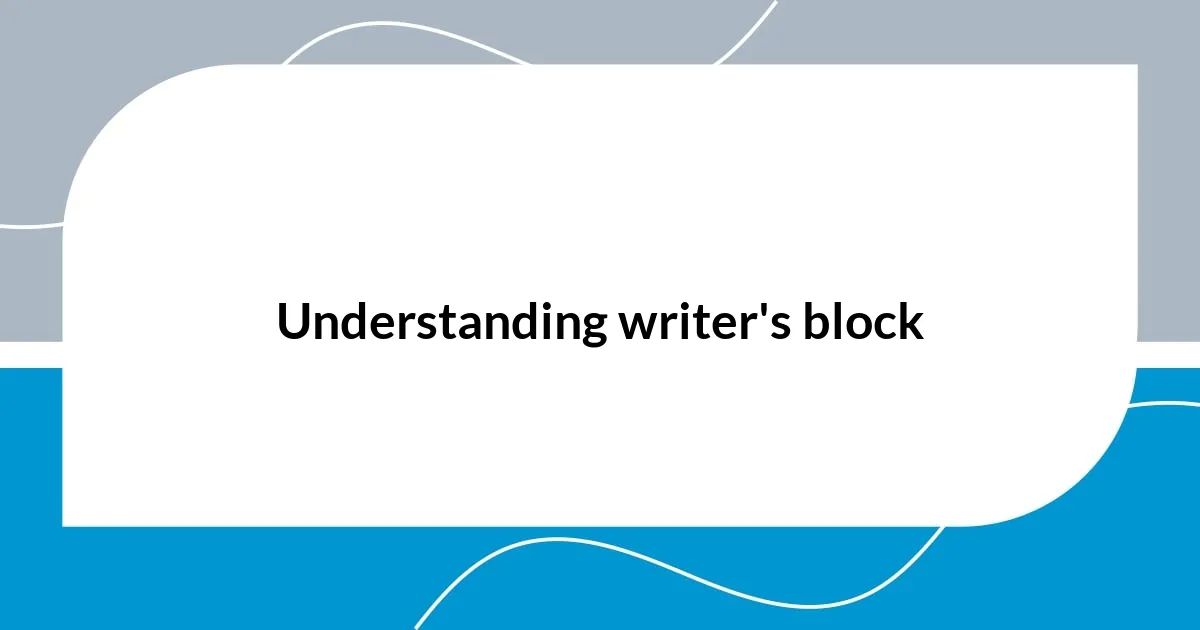
Understanding writer’s block
Understanding writer’s block can be frustrating, and I remember grappling with it during a particularly busy period in my life. It felt as if my creativity had been locked in a vault, and the key was lost. Have you ever felt that icy grip on your inspiration, where every attempt to put pen to paper only leads to silence?
Sometimes, I reflect on what causes that block. It’s often a mix of pressure to produce something perfect and the nagging doubts about one’s abilities. I’ve found myself staring at a blank screen, questioning if my ideas are good enough, which just deepens the frustration. Isn’t it interesting how our own thoughts can become the very barriers to our expression?
I’ve learned that awareness is key. Recognizing when I’m overwhelmed or uninspired has helped me to accept the moment without judgment. For instance, when I finally took a step back and acknowledged my fear of failure, it felt liberating. What if embracing my struggles could be the catalyst for my best work yet? Realizing that writer’s block is a common experience has shifted my perspective, allowing me to approach it with a sense of curiosity rather than despair.
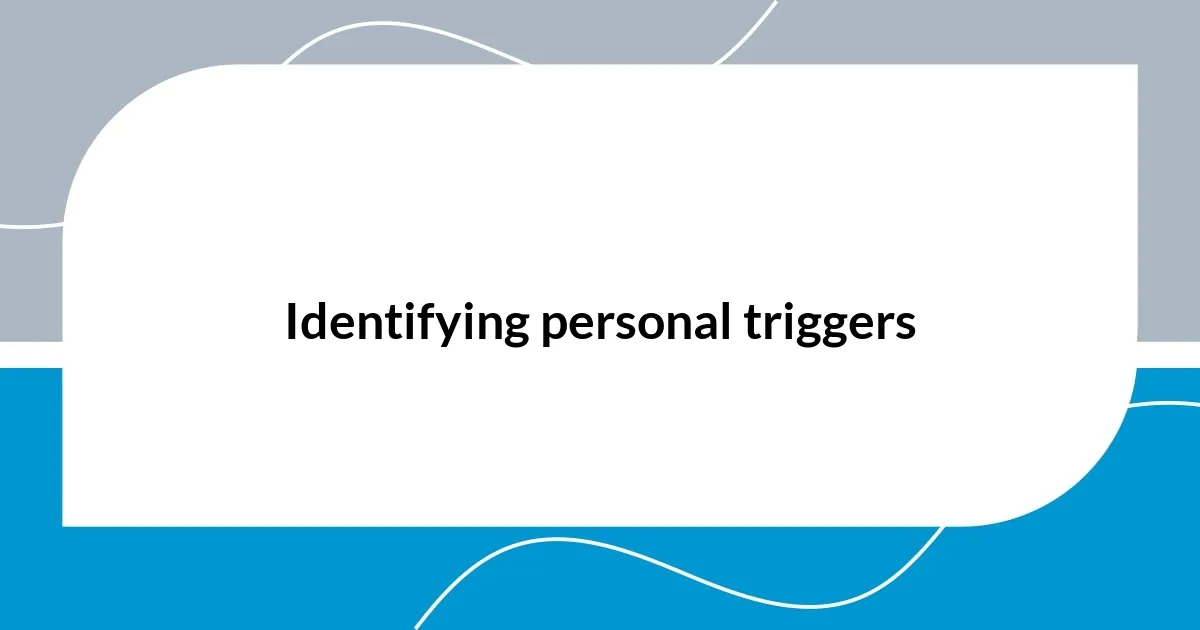
Identifying personal triggers
Identifying personal triggers has been a journey in itself. I remember a time when just entering my writing space filled me with anxiety because of the pressure I put on myself. This led me to realize that certain environments or situations—like being among distractions or having looming deadlines—could ignite my writer’s block. Have you ever noticed how a noisy café can either inspire you or make it impossible to concentrate?
Through this experimentation, I started keeping a journal of my writing habits, noting what conditions coincided with creative flow and what preceded a block. I discovered that my mental state often influenced my output; stress or self-doubt could spark a full-on shutdown. It’s fascinating how understanding these patterns can empower us to create strategies—like scheduling quiet hours dedicated solely to writing.
Sometimes, simply shifting my perspective on what triggers my writing struggles has been essential. Instead of seeing my need for a break as a weakness, I learned to view it as a necessary part of my creative process. Embracing flaws and taking time away from my work ultimately built a healthier relationship with writing. Have you ever paused to consider how your emotions are intricately linked to your creative output?
| Trigger | Effect on Writing |
|---|---|
| Noisy Environment | Increased Anxiety |
| Imposing Deadlines | Pressure to Perform |
| Feelings of Self-Doubt | Creative Shutdown |
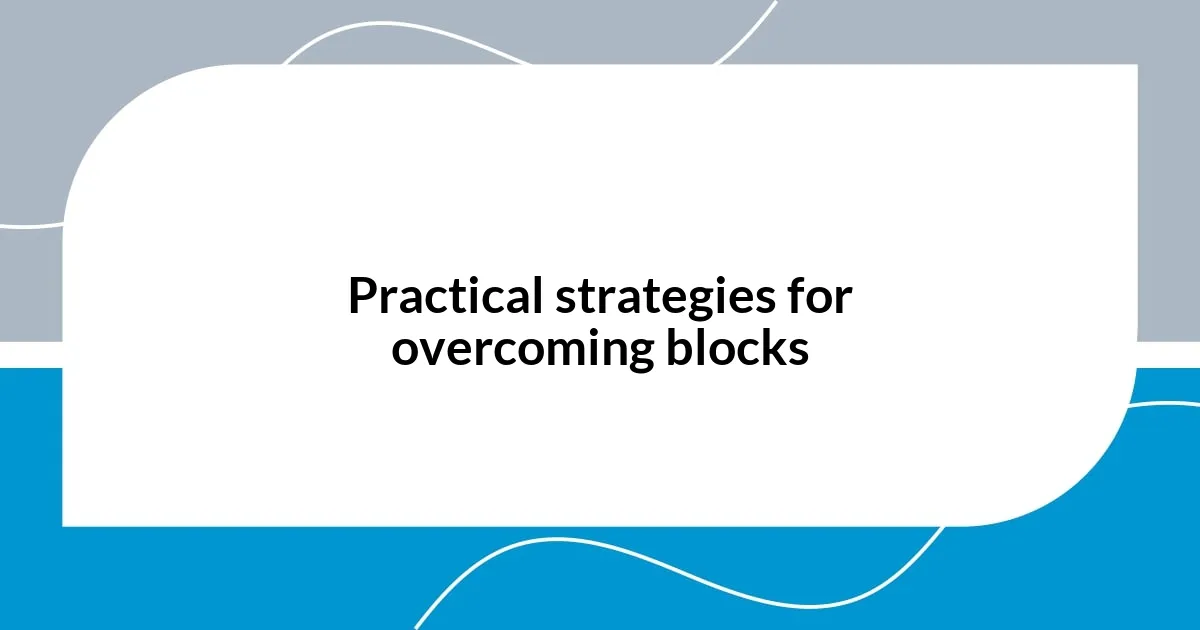
Practical strategies for overcoming blocks
Over the years, I’ve accumulated a toolkit of practical strategies for overcoming writer’s block. One approach that worked wonders for me was to establish a dedicated writing routine. The comfort of knowing when and where I would write helped me to ease into the process. I remember setting aside the early mornings, a quiet time when my thoughts flowed more freely. In those peaceful moments, I felt more connected to my ideas, allowing them to unfold without interruption. Have you ever noticed how consistency can turn an intimidating task into a familiar habit?
- Set specific writing times to create a routine.
- Break down writing tasks into smaller, manageable goals.
- Utilize prompts or exercises to ignite creativity.
- Incorporate breaks to recharge your mind.
- Experiment with different environments to find what inspires you.
Another strategy that I found incredibly helpful was simply stepping away when creativity stalled. I’ll never forget the day I decided to take a walk instead of forcing words onto the page. As I immersed myself in nature, my mind opened up, and ideas began to bubble back to the surface. Sometimes, a change of scenery and a little fresh air can work wonders for the creative spirit. Do you remember a time when stepping back actually brought you clarity?
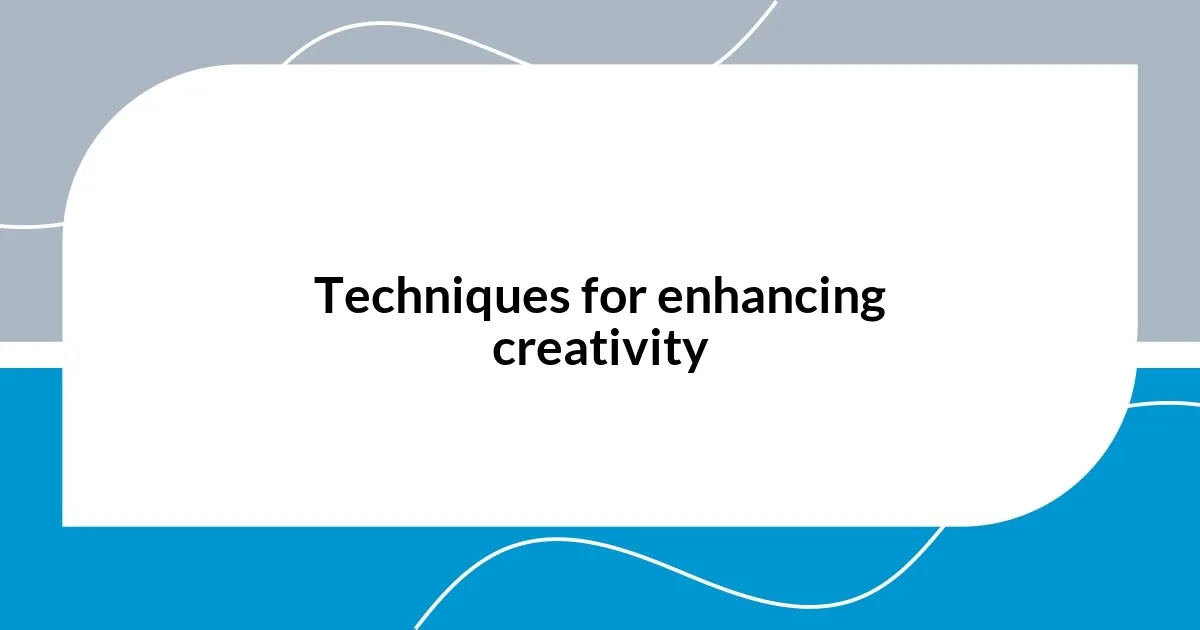
Techniques for enhancing creativity
One powerful technique I’ve embraced for enhancing creativity is the concept of “free writing.” This is where I commit to writing continuously for a set period—usually fifteen minutes—without worrying about grammar or structure. I remember the first time I tried it; I felt liberated as thoughts flowed onto the page, unfiltered. That raw expression often sparked insights I wouldn’t have accessed otherwise. Have you ever let your thoughts spill out without the weight of judgment?
Another method that resonates with me is engaging in creative hobbies outside of writing, such as painting or playing music. I find that picking up a paintbrush or strumming a guitar can ignite that creative spark within my writing. When I indulge in these activities, I shift my mindset and tap into a different part of my brain. It’s incredible how breaking the routine can actually enhance my writing. What hobbies have you explored that unexpectedly influenced your creative process?
Lastly, I’ve learned to embrace the power of collaboration with fellow creatives. Sharing ideas during brainstorming sessions can open up new perspectives I hadn’t considered before. I still remember a late-night chat with a friend about our writing struggles, where her approach to character development sparked a whole new direction for my own work. It’s astonishing how connecting with others can breathe life into our creative endeavors. Have you sought out partnerships that invigorated your ideas?
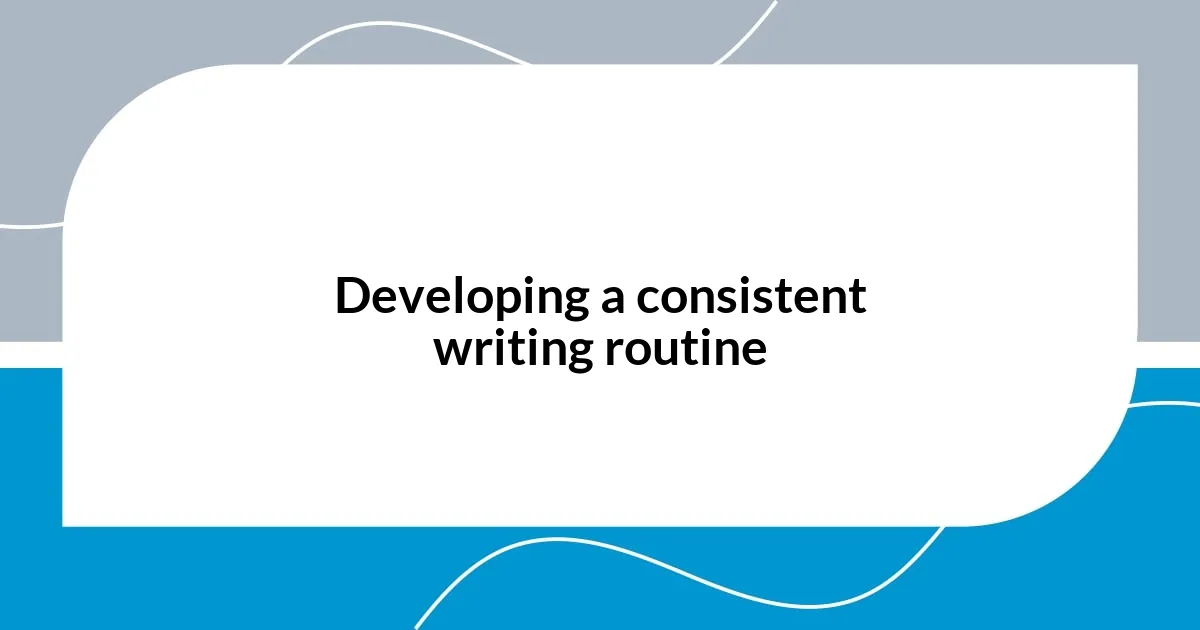
Developing a consistent writing routine
Establishing a consistent writing routine has genuinely transformed my creative process. When I decided to block off time every afternoon in my cozy little nook, it felt like I was creating my own sacred space. I began to see writing not as a chore but as a much-anticipated appointment with myself. Have you ever felt a shift like that, where suddenly the act of writing became something you looked forward to?
As I refined my routine, I experimented with different lengths of writing sessions. There were days when I’d set a timer for just twenty minutes, which surprisingly proved to be the sweet spot for me. I found that starting small took away the intimidation factor. I often wondered, what if the key to unlocking my creativity was simply giving myself permission to write without pressure?
Now, I also make a point to reflect on how I felt after each session. I’ve noticed that when I write in the same spot or at the same time, certain emotions begin to surface. For instance, on days when I utilized soothing tea as part of my routine, I felt a familiar warmth that led to deeper insights in my writing. Have you considered how creating emotional associations with your writing time might alter your experience?
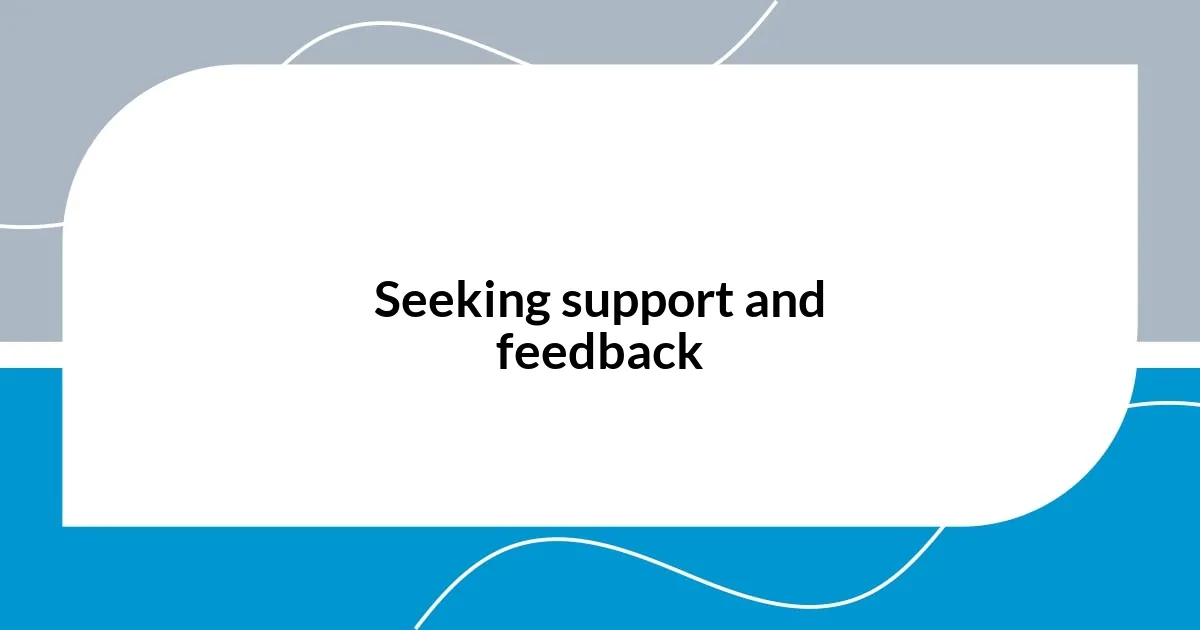
Seeking support and feedback
Seeking support and feedback has been a game changer for me on my writing journey. There were moments when I felt entrenched in a creative fog, and opening up to fellow writers about my struggles was a breath of fresh air. I vividly remember a writing group I joined where sharing drafts not only gave me constructive criticism but also a sense of camaraderie that made the process feel less isolating. Have you ever found solace in a community that understands your struggles?
One particular instance stands out when I nervously presented a poem I’d poured my heart into. The vulnerability of sharing my work made me anxious, but the encouragement and insights I received were invaluable. A fellow poet pointed out lines that resonated emotionally, which motivated me to delve deeper into those themes. This experience taught me that feedback isn’t just about fixing weaknesses; it’s also about amplifying strengths. Have you considered how feedback can help illuminate your unique voice?
I also seek support through online forums and social media platforms. There’s something magical about connecting with writers from around the world who are facing similar hurdles. I once participated in a Twitter chat about overcoming writer’s block, where I discovered techniques that people swore by. It was a reminder that creativity frequently thrives in collaboration. How often do you reach out for support when you hit a wall?
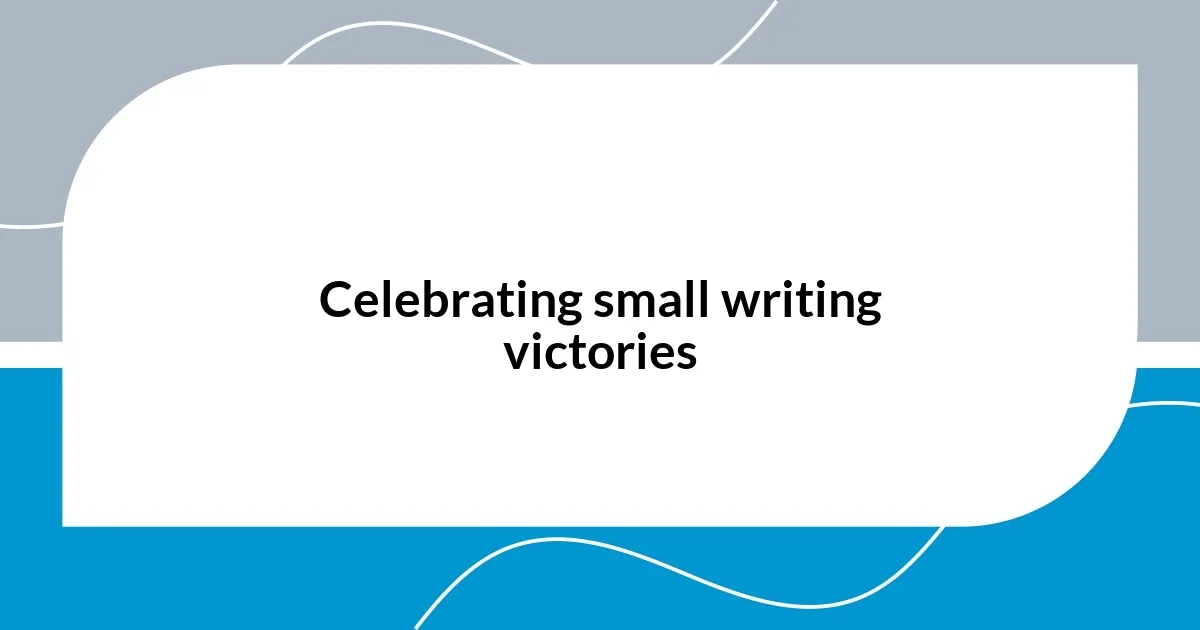
Celebrating small writing victories
Recognizing and celebrating small writing victories has truly reshaped my outlook on the entire creative process. I remember one day feeling particularly stuck, and when I finally managed to pen just a single paragraph, it felt monumental. That tiny achievement, though seemingly insignificant, sparked a wave of motivation that propelled me forward. Have you ever noticed how these small victories can ignite something bigger within you?
Another time, I set a goal to write 100 words a day for a week. During those days, the realization that I could easily reach my target filled me with pride. Each little milestone felt like a step up a staircase—I could see progress without being overwhelmed. I often found myself asking, how can such a seemingly minor achievement create such a profound sense of accomplishment?
The joy of celebrating these moments doesn’t just lift my spirits; it fosters a deeper connection to my craft. When I received a compliment from a friend about a short piece I wrote during this period, it reinforced that even small contributions matter. It makes me think, what if these little wins could inspire us to embrace our writing journeys more passionately?